Choosing the right eCommerce platform is crucial for any business looking to establish an online presence, and Shift4Shop vs Shopify are among the most popular solutions. Both offer a wide range of tools and features designed to help businesses build, manage, and scale their online stores, but they cater to different types of businesses and come with unique strengths and weaknesses.
If you are standing between the choice of Shift4Shop or Shopify, you're in the right place! In this article, we’ll compare Shift4Shop vs Shopify across several key criteria, including:
- Pricing
- Ease of use
- eCommerce features
- Design & templates
- Apps & integrations
- Customer support
- Security
With no further hesitation, let's get right into it.
Shift4Shop vs Shopify – An Overview
To make an informed decision, I believe it’s essential to take a look at the brief understanding of Shift4Shop and Shopify. With over 4 years of experience working with these platforms, I have compiled this quick overview of both platforms, setting the stage for a more detailed comparison of their features.
Shift4Shop pros and cons
Shift4Shop, previously known as 3dcart, is an all-in-one eCommerce platform designed to provide businesses with a comprehensive set of tools to build and manage online stores. It’s particularly appealing to businesses looking for a solution that offers a range of built-in features without needing to rely on third-party apps.
The platform supports a variety of store types and is designed to accommodate both small businesses and larger enterprises. While Shift4Shop may not have as large of an app marketplace as some other platforms, it compensates with robust, in-house features that help streamline eCommerce operations.

Below are Shift4Shop pros and cons so you can have a better consideration of this option.
Pros | Cons |
- Offers a free plan for businesses, making it a great option for startups or businesses with tight budgets. - Charges no transaction fees on every sale. - Is equipped with a good range of built-in eCommerce features. - Provides access to over 100+ payment gateway options. | - Requires a steeper learning curve than Shopify. - Offers an adequate range of themes, but these options are quite basic. - Require technical knowledge to perform advanced design customization. - Provide a not as diverse marketplace as Shopify. |
Shopify pros and cons
Shopify is one of the most popular eCommerce platforms globally, known for its user-friendly interface and scalability. It’s designed to help businesses—from small startups to large enterprises—quickly set up and grow their online stores.
Its simple, drag-and-drop interface is ideal for entrepreneurs and businesses that may not have a technical background but still want powerful features. Shopify is also widely recognized for its seamless integrations with various payment processors, shipping services, and third-party applications, giving businesses the tools they need to scale quickly and efficiently.

Here, we have compiled a list of Shopify pros and cons for your consideration.
Pros | Cons |
- All-in-one solution for effortless management - Easier setup compared to WooCommerce - Powerful out-of-the-box features to support your business - Extensive app store to further enhance your business's capability - Stronger built-in security features | - High transaction fee (up to 5%) - Limited design flexibility - Potentially higher costs with premium themes and apps - Content limitations within the blog functionality |
>> If you want to learn more about Shopify, don't forget to check out our in-depth Shopify reviews to get more insights on this platform.
Shift4Shop vs Shopify – Who Are They For?
Both Shift4Shop vs Shopify are designed to support businesses in building and managing their eCommerce stores, but they cater to different types of users based on their needs, budgets, and growth goals. Let’s explore who each platform is best suited for and compare their strengths across key criteria.
➱ Choose Shift4Shop if you are:
- Small businesses and startups.
- Cost-conscious businesses that prioritize a free or low-cost plan.
- eCommerce users who are comfortable with a slightly steeper learning curve
➱ Choose Shopify if you are:
- Entrepreneurs and businesses of all sizes, from startups to enterprises.
- Users seeking an easy-to-use platform
- Businesses focused on growth and scalability
If you still don't know what to choose between Shift4Shop vs Shopify, here's a quick breakdown of which platform takes the lead on different criteria.
Shift4Shop | Shopify | Who Wins | |
Ease of Use | Steeper learning curve that requires technical skill. | Extremely user-friendly with a drag-and-drop interface. | Shopify |
Pricing | Starting from $0 per month, custom plans available. No transaction fees. | From $5 to $299 per month. Up to 5% transaction fees. | Shift4Shop |
eCommerce Features | Good built-in features like SEO tools, POS, and multi-currency support. | Powerful built-in tools combined with an extensive app marketplace for advanced capabilities. | Shopify |
Design and Templates | 100+ free themes Limited design flexibility. | 10+ free, 200+ paid themes High customizability with Shopify Liquid. | Shopify |
Apps and Integration | 300+ third-party integrations on its App Marketplace. | 6,000+ third-party integrations on its App Marketplace. | Shopify |
Customer Support | 24/7 support via phone call and email. | 24/7 support via live chat, phone call, and email. | Shopify |
Security | PCI-DSS compliant, SSL encryption, and fraud protection. | Advanced security features, including SSL encryption and fraud detection. | A tie |
Transfer Shift4Shop to Shopify with Ease!
If you want to migrate to Shopify for advanced features, LitExtension is here to help.

Pricing – Shift4Shop Is More Affordable
Pricing plays a crucial role in selecting an eCommerce platform, especially for businesses aiming to balance costs and features. Both Shift4Shop vs Shopify offer competitive pricing structures, but their approaches cater to different business needs.
Shift4Shop is a cost-effective option, particularly for businesses willing to use its integrated payment processing system, Shift4 Payments. The platform stands out with its free End-to-End plan, which allows businesses to operate at no cost if they process payments through Shift4 Payments. Nonetheless, please note that this free plan is only available for merchants in the US. Therefore, if you are an international online seller, you might need to opt for other pricing tiers offered by this platform.
For businesses that are ineligible or opt not to use this service, Shift4Shop pricing offers four other options, ranging from $19 to $229 per month. All pricing tiers allow merchants to add an unlimited number of products with unlimited bandwidth, which makes this platform truly stand out from other competitors in the market. On top of that, Shift4Shop charges zero transaction fees regardless of the sales volume, making it a more affordable solution than Shopify.
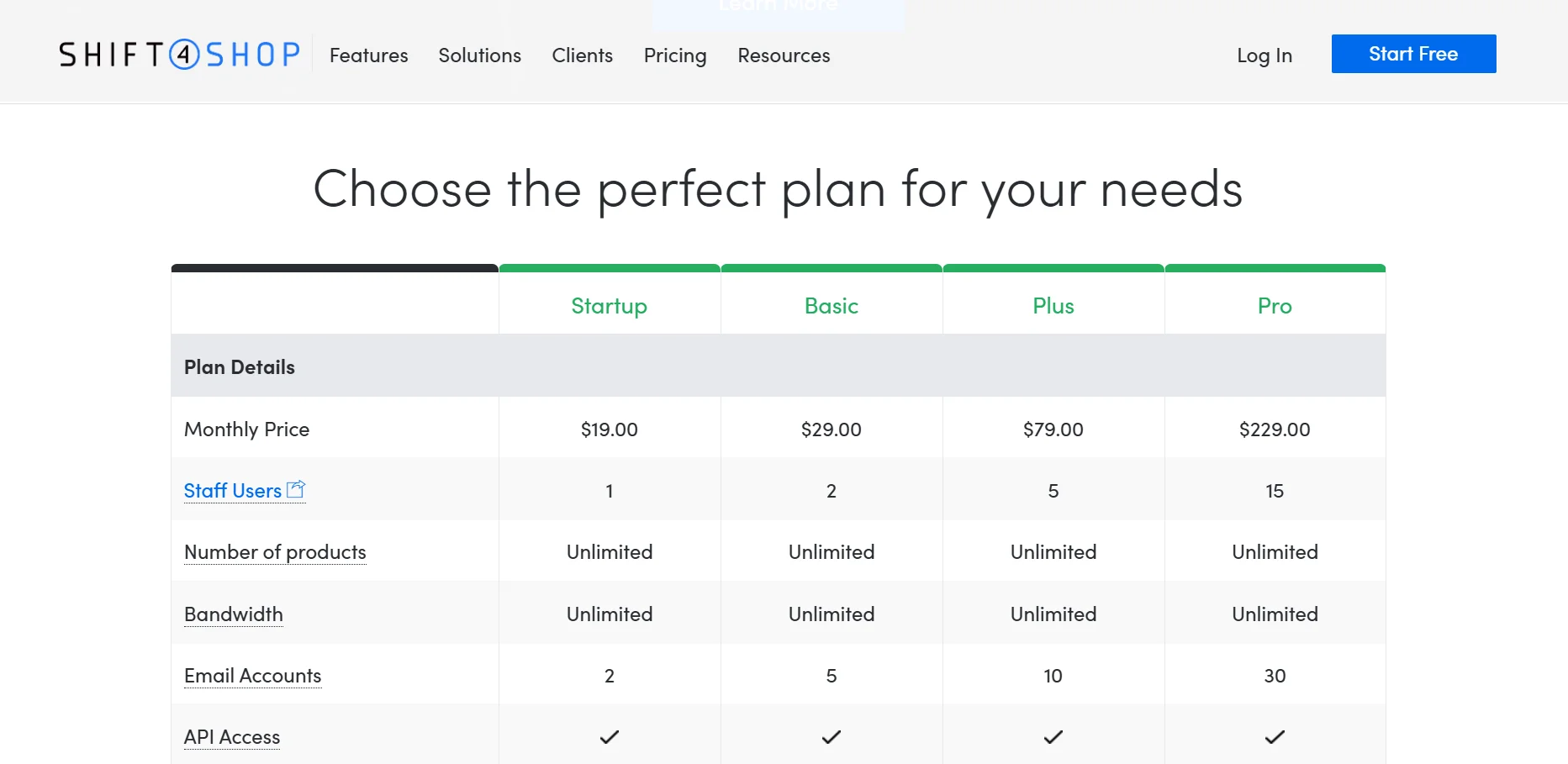
On the other hand, Shopify pricing is designed for flexibility and scalability. You can test the water with its 3-day free trial then extend the period for three more months at just $1 each, if you're still not sure. After that, opt for one of the Shopify pricing tiers, which start at $29 per month for the Basic plan, progressing to $79 per month for the Shopify plan and $299 per month for the Advanced plan, if billed annually. The higher the tier is, the more access to additional features (such as advanced reporting, more staff accounts, and reduced credit card fees) you'll get.
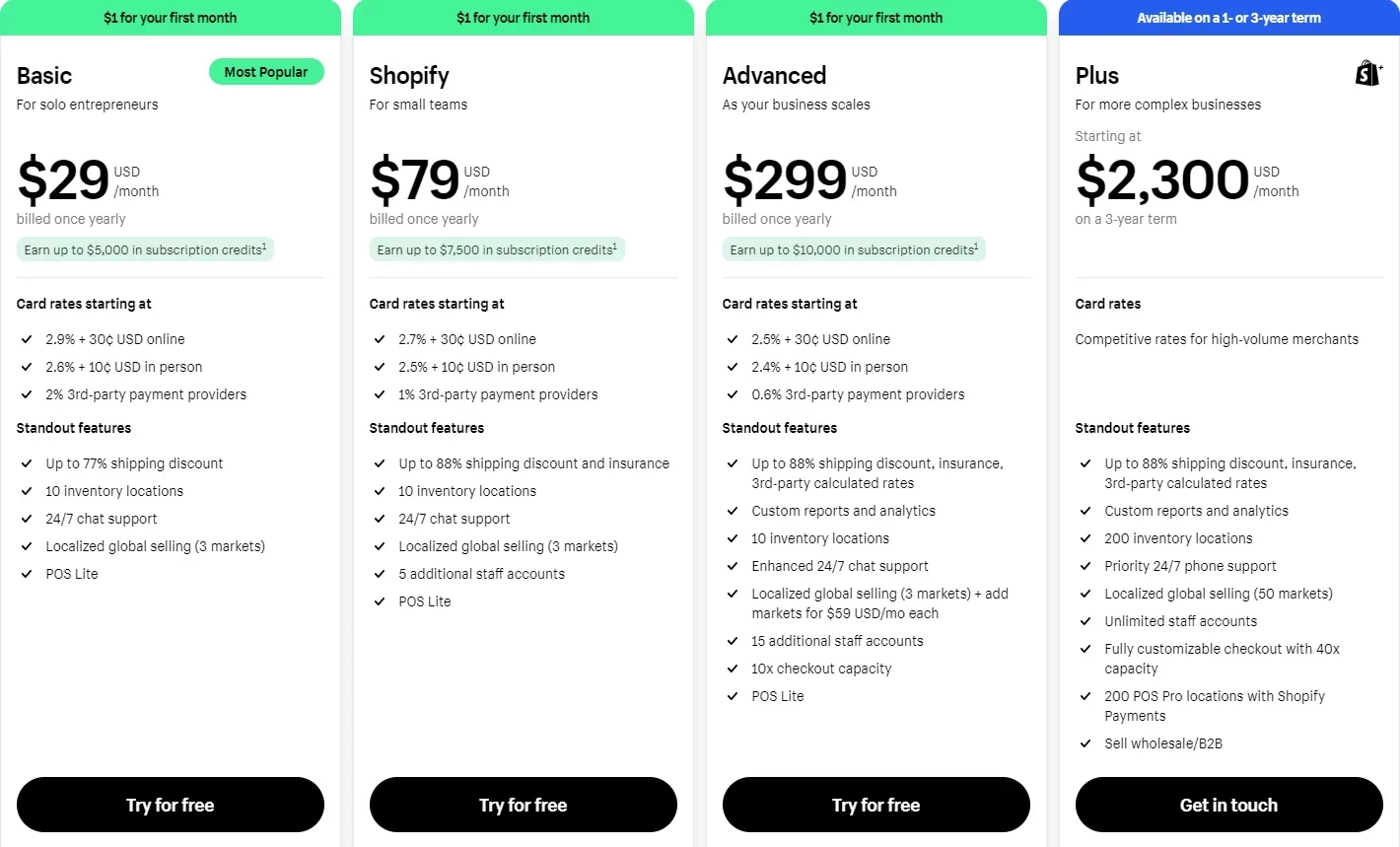
Additionally, Shopify charges transaction fees ranging from 0.5% to 2% for businesses that do not use Shopify Payments, making it less cost-effective for those preferring other payment gateways.
➤ The verdict:
In this pricing comparison between Shift4Shop vs Shopify, Shift4Shop clearly takes the lead. Thanks to its free plan, affordable pricing structure, and zero transaction fees, I believe this platform is a more budget-friendly option, especially for startups and small businesses.
Ease of Use – Shopify Is More User-Friendly
When choosing an eCommerce platform, ease of use is definitely a key consideration, especially for entrepreneurs and small businesses without technical expertise. Hence, when comparing Shift4Shop vs Shopify, I cannot ignore this criterion in my article.
Shift4Shop is a feature-rich platform, but its complexity can make it less accessible for beginners. While it provides a comprehensive set of built-in tools, configuring and managing these features may require a degree of technical knowledge. The interface, while functional, is not as intuitive as some of its competitors.
So overall, from my observation, Shift4Shop might be the perfect solution for users who are familiar with eCommerce setups or those willing to invest time in learning the system. However, for those new to eCommerce or seeking a quick, seamless setup process, the platform may be overwhelming.
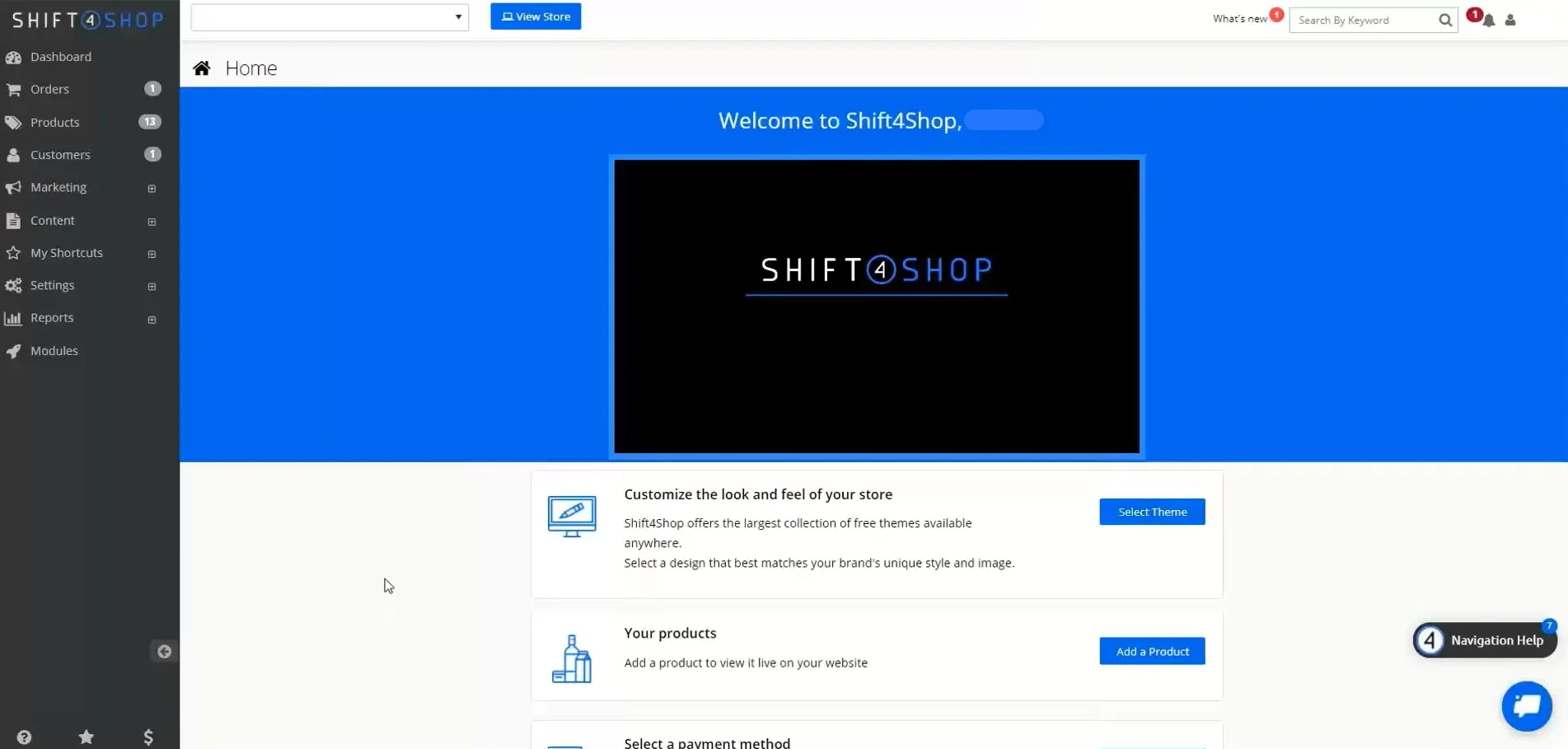
In contrast, Shopify is widely recognized for its user-friendly design. Its drag-and-drop store builder allows users to create and customize their online store with minimal effort, even without any coding experience. Shopify’s interface is clean and intuitive, with a well-organized dashboard that provides easy access to key functions such as product management, order processing, and marketing tools. With Shopify, you can quickly set up a fully functional eCommerce store without breaking a sweat, regardless of your technical expertise.
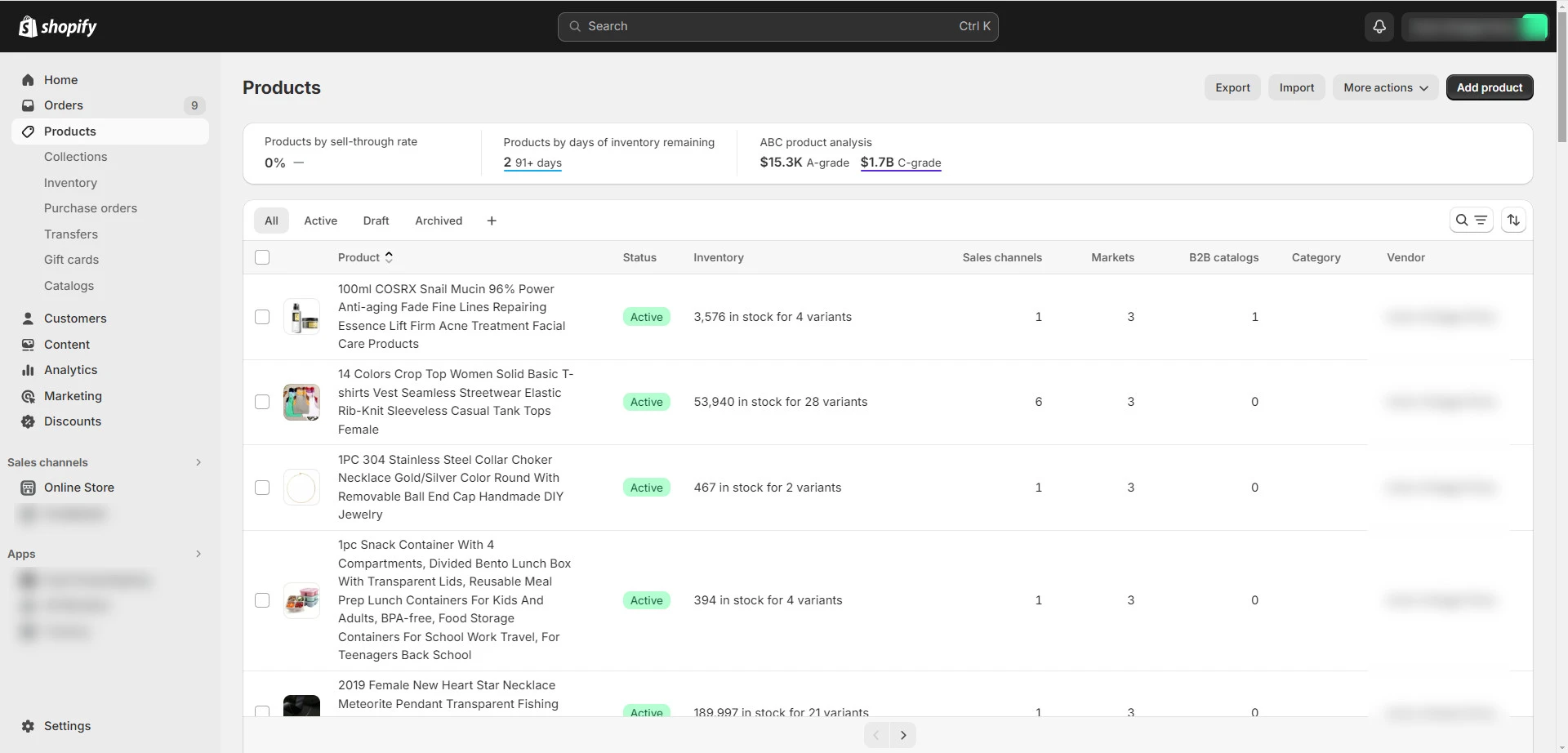
➤ The verdict:
Shopify takes the lead between Shift4Shop vs Shopify in terms of ease of use. Its intuitive interface, drag-and-drop functionality, and clean design make it an ideal choice for beginners and non-technical users. This platform ensures that users can quickly set up and manage their stores with no requirement on their tech stack.
eCommerce Features – Shopify Is More Powerful
Inventory management
Effective inventory management is essential for any eCommerce business to ensure smooth operations, avoid stockouts, and maintain customer satisfaction. Both Shift4Shop vs Shopify offer tools to help businesses manage their inventory, but these platforms take slightly different approaches.
Shift4Shop provides robust, built-in inventory management tools that allow businesses to track stock levels, set inventory alerts, and manage product variations seamlessly. Its system supports unlimited products and SKU management, making it suitable for businesses with large and diverse inventories. Additionally, Shift4Shop includes features like low-stock notifications and automated inventory updates, helping store owners stay on top of their stock levels without relying heavily on third-party apps.
However, while functional, the user interface for inventory management may feel less intuitive for beginners, requiring time to fully understand and utilize its capabilities.
Shopify also offers a comprehensive inventory management system, but it shines in its simplicity and ease of use. The platform enables users to add and organize products, track inventory across multiple locations, and set up low-stock alerts through its user-friendly dashboard. Shopify integrates seamlessly with third-party inventory apps, giving businesses access to advanced features like demand forecasting and multi-channel inventory synchronization.
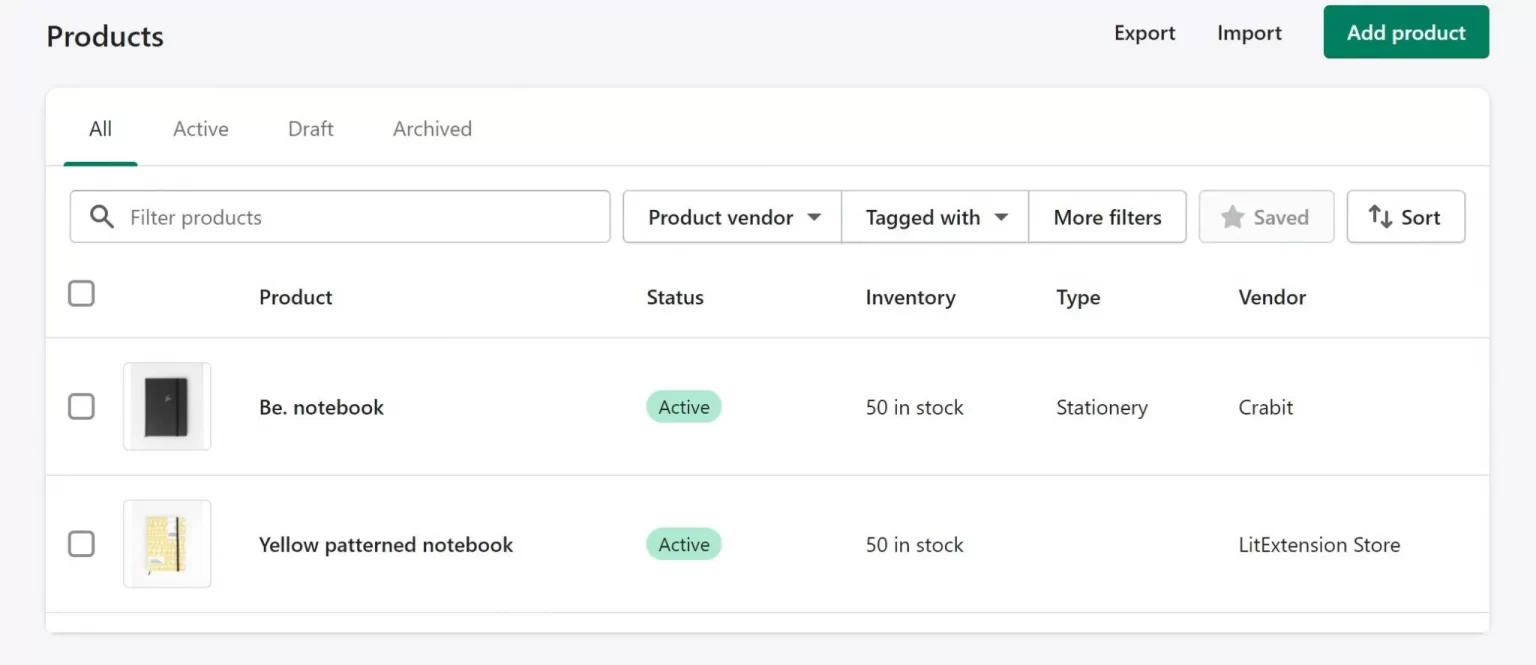
➤ The verdict:
Between Shift4Shop vs Shopify in terms of inventory management, Shopify wins for its powerful built-in features. On top of that, its user-friendly interface and seamless integration with third-party tools make it a flexible and accessible choice for businesses of all sizes.
Fulfillment and delivery
Fulfillment and delivery are among the critical aspects when comparing Shift4Shop vs Shopify. In this section, let's explore how well each platform does in this criterion.
Shift4Shop offers a range of built-in features to support fulfillment and delivery processes. It allows store owners to set up multiple shipping methods, including real-time shipping rate calculations for major carriers such as USPS, FedEx, and UPS. The platform also supports automated tax calculations and provides tools for printing shipping labels directly from the admin panel.
On the other hand, Shopify excels in fulfillment and delivery, offering a highly intuitive system that integrates seamlessly with a variety of shipping carriers and fulfillment services. Shopify’s partnership with Shopify Fulfillment Network (available in select regions) provides an all-in-one solution for inventory storage, order packing, and delivery. Additionally, Shopify integrates with leading shipping apps to provide real-time rate calculations, label printing, and multi-location inventory syncing.
➤ The verdict:
When it comes to fulfillment and delivery between Shift4Shop vs Shopify, Shopify takes the lead thanks to its intuitive interface, strong integrations with third-party apps, and access to the Shopify Fulfillment Network.
Reporting and analytics
Both Shift4Shop vs Shopify offer tools to help store owners analyze their business, but they differ in the depth and accessibility of these features.
Shift4Shop includes built-in reporting tools that provide detailed insights into key metrics, such as sales performance, inventory levels, and customer behavior. The platform allows users to generate reports on product sales, order history, and abandoned carts. Shift4Shop’s reports are customizable, enabling users to tailor them to specific business needs. However, the analytics interface can feel less intuitive, especially for those unfamiliar with navigating advanced reporting tools.
Shopify, on the other hand, offers a streamlined reporting and analytics experience that caters to both beginners and advanced users. Depending on the pricing plan, Shopify provides varying levels of reporting capabilities. The Basic plan includes essential metrics like sales, traffic, and conversion rates, while higher-tier plans unlock advanced reporting, such as customer lifetime value, cohort analysis, and profit margins. The platform's user-friendly dashboards and clear visualizations make it easy for users to monitor performance and identify trends without extensive technical knowledge.
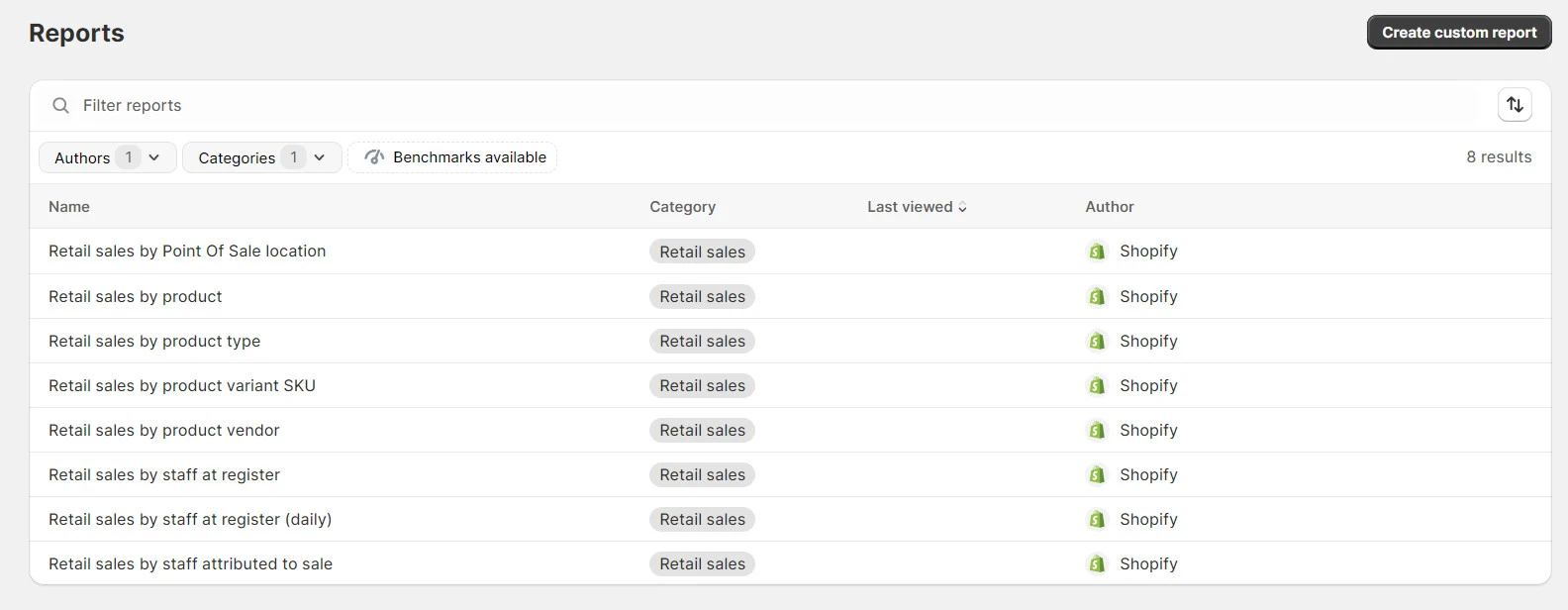
➤ The verdict:
Shopify wins between Shift4Shop vs Shopify in reporting and analytics, thanks to its combination of accessibility, scalability, and integration capabilities. Its user-friendly interface ensures that even beginners can easily navigate and understand key metrics such as sales performance, conversion rates, and traffic. The scalability of its reporting tools, which expand with higher-tier plans, provides advanced insights like customer lifetime value and cohort analysis for growing businesses.
Marketing and SEO tools
Shift4Shop comes equipped with robust built-in SEO tools, making it an excellent choice for businesses focused on organic search visibility. These tools include customizable URLs, meta tags, sitemaps, and structured data support, which help improve search engine rankings. Shift4Shop also allows businesses to set up and manage promotions like discounts and coupon codes directly from the platform. Email marketing is integrated as well, enabling store owners to create and send newsletters to their customers without relying on third-party apps.
However, while the SEO capabilities are advanced, the marketing tools are more basic and may not provide the depth or flexibility needed by businesses with more complex marketing strategies.
Shopify, on the other hand, takes a more versatile approach to marketing and SEO. While its built-in SEO features – such as editable meta tags, automatic sitemaps, and mobile responsiveness – are effective, they are less comprehensive than Shift4Shop’s. Where Shopify truly excels is in its marketing capabilities. The platform integrates seamlessly with popular email marketing, social media, and advertising tools, allowing businesses to run campaigns across multiple channels. Shopify also provides basic built-in marketing automation, such as abandoned cart recovery, which can help improve sales conversions.
➤ The verdict:
The competition between Shift4Shop vs Shopify in marketing and SEO is close, but Shopify takes the lead thanks to its versatility and integration capabilities. This platform provides businesses with the flexibility to execute multi-channel marketing campaigns through its vast app marketplace and seamless third-party integrations. Additionally, Shopify’s ability to combine basic SEO with advanced marketing tools ensures that businesses can attract, engage, and retain customers across various platforms, making it the better choice for comprehensive marketing strategies.
Design and Templates – Shopify Offers More Design Flexibility
When assessing Shift4Shop vs Shopify, I cannot miss their ability to create visually appealing websites. Both Shift4Shop and Shopify offer customizable design options, but the flexibility, quality, and ease of use of these templates differ significantly.
Shift4Shop provides a variety of design templates that cater to different industries and business needs. The platform offers over 50 themes, many of which are responsive and mobile-friendly. However, compared to Shopify, the designs can feel a bit outdated or less modern, and there is a limited selection of highly customizable themes. While Shift4Shop allows users to make changes to the themes via HTML and CSS, those without coding knowledge may find the customization process a bit more challenging.
On another note, Shopify excels in offering a wide selection of high-quality, modern, and mobile-responsive themes. Shopify themes provide over 200 options of free and premium themes, all designed to be visually appealing and adaptable to various industries.
These website templates are highly customizable through its user-friendly drag-and-drop interface, allowing store owners to personalize their website without needing to know any code. The customization options are broad, from color schemes to typography and layout adjustments. For more advanced design tweaks, Shopify offers access to the theme’s code via Shopify Liquid, giving developers the flexibility to modify the site as needed.
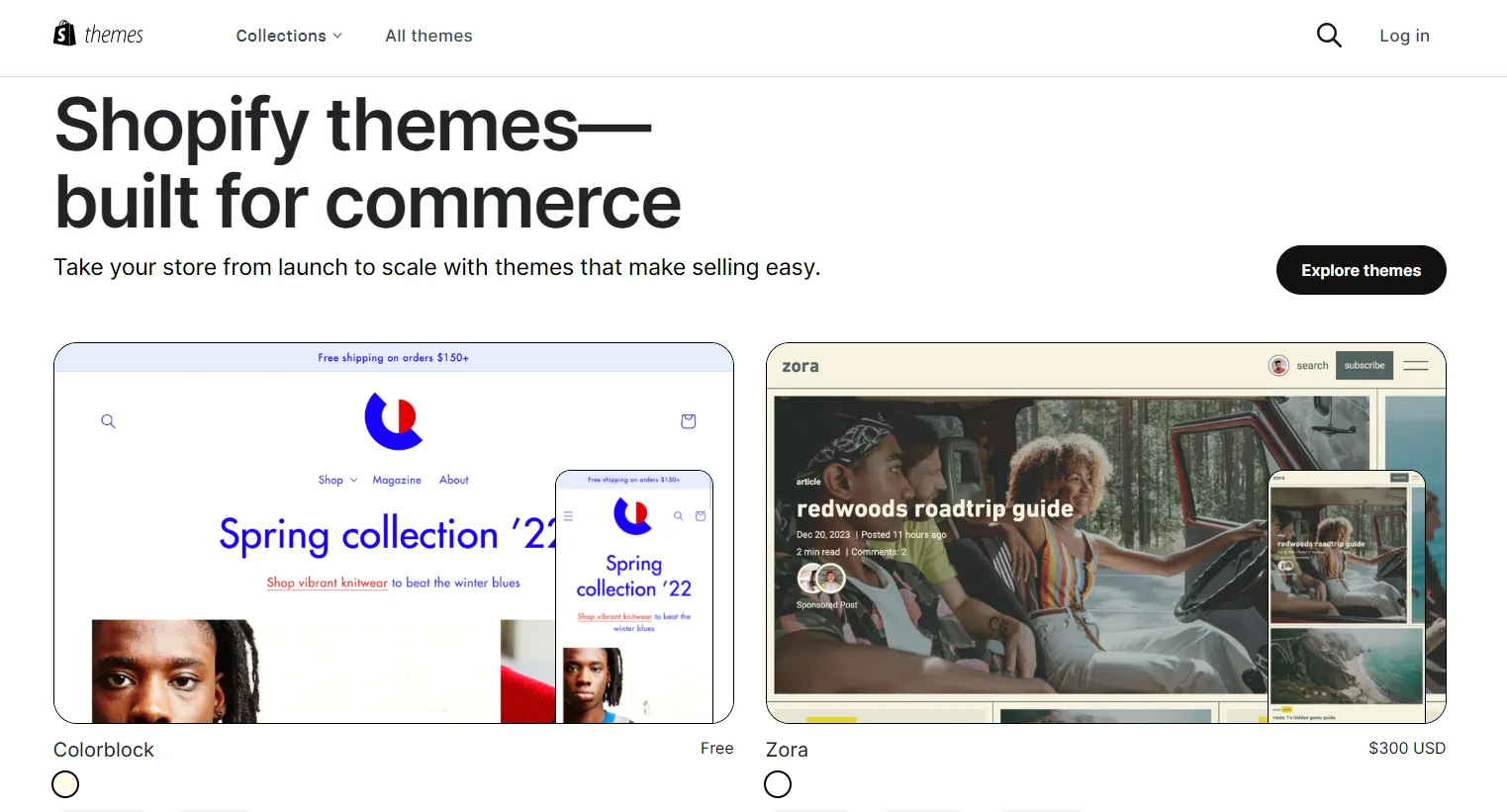
➤ The verdict:
I must say Shopify is clearly the winner between Shift4Shop vs Shopify when it comes to design and templates. The extensive range of free and premium themes, along with the ease of customization, allows businesses to create a professional and unique online store with minimal effort.
Apps & Integration – Shopify Takes The Lead
The ability to extend the functionality of an eCommerce store through apps and integrations is essential for businesses seeking to streamline operations, enhance customer experiences, and scale efficiently. Both Shift4Shop vs Shopify offer various integrations, but their app ecosystems and ease of integration differ significantly.
Shift4Shop provides a solid range of app selections, but its app marketplace is more limited than Shopify, offering fewer options for extending functionality. Shift4Shop integrates with popular payment gateways, shipping providers, and marketing tools like Mailchimp and Google Analytics, but businesses may find that certain specialized features, such as advanced reporting tools or CRM systems, are harder to integrate.
For businesses with specific needs, Shift4Shop allows integration with custom APIs, but this often requires technical expertise to implement effectively.
Meanwhile, Shopify is renowned for its extensive app marketplace, which boasts thousands of apps and integrations across various categories, including marketing, customer service, inventory management, shipping, accounting, and analytics. The platform integrates with virtually every major eCommerce tool, from payment gateways like PayPal and Stripe to marketing platforms such as Facebook, Google Ads, and Klaviyo. Shopify’s extensive app library allows businesses to find specialized solutions tailored to their unique needs, whether it’s optimizing email marketing, improving customer engagement, or integrating with ERP systems.
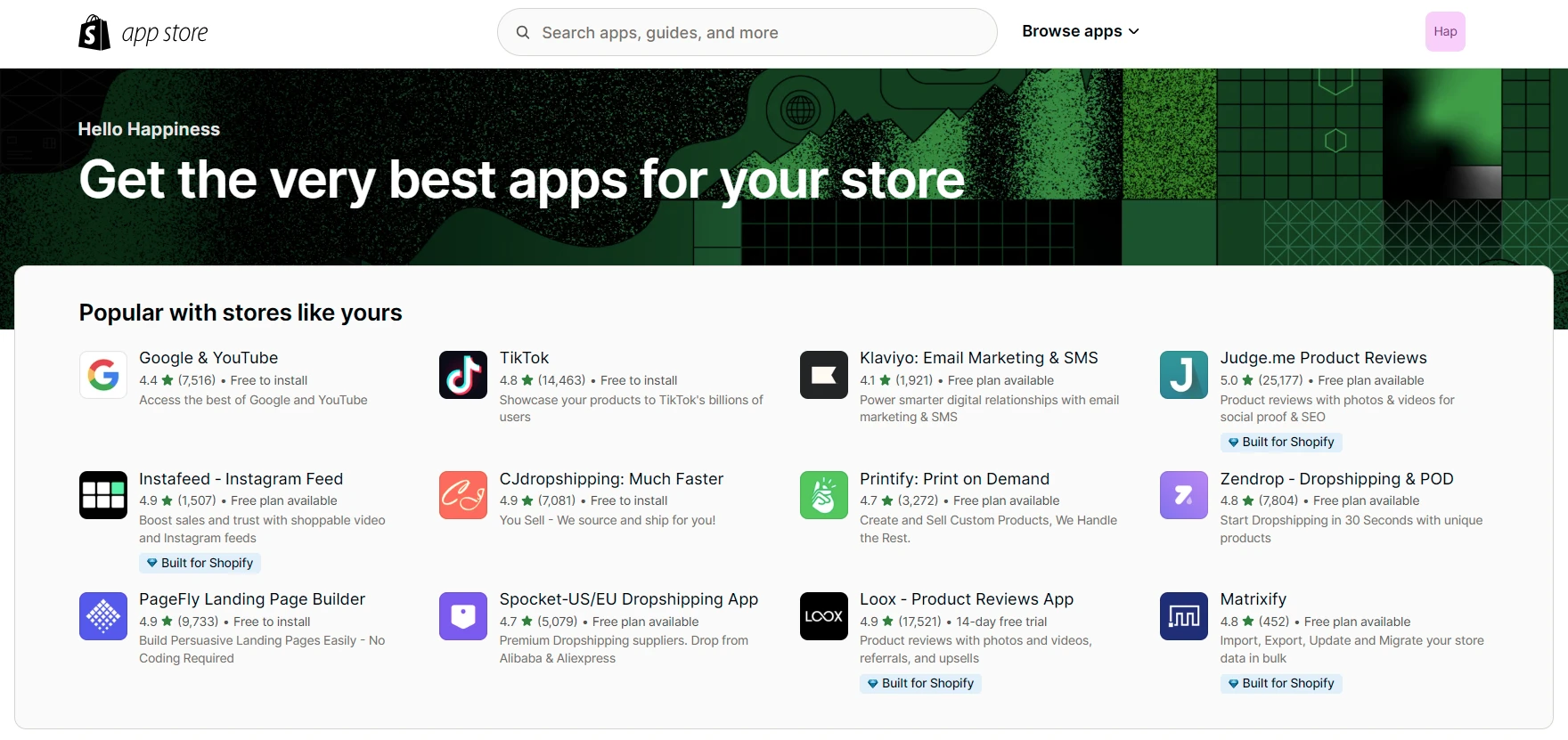
Shopify’s ease of integration is one of its standout features. Most apps can be installed with a single click, and the user-friendly interface ensures that non-technical users can easily add and configure integrations. For more complex integrations, Shopify’s APIs offer flexibility, allowing businesses to customize their store’s functionality or integrate with third-party systems seamlessly.
➤ The verdict:
When it comes to Shift4Shop vs Shopify apps and integrations, Shopify wins in this category. Its massive app marketplace, ease of integration, and a broad range of third-party tools provide businesses with unparalleled flexibility and functionality. Shopify’s vast selection of apps ensures that businesses can find the perfect solution to meet their needs with ease.
Customer Support – Shopify Takes The Lead
Shift4Shop offers a range of support options, including 24/7 customer service through phone calls and email. This round-the-clock availability ensures that store owners can get assistance at any time, regardless of time zone. Shift4Shop also provides a comprehensive knowledge base with tutorials, guides, and FAQs to help users solve common issues on their own.
However, I've seen several complaints that while Shift4Shop’s support team is knowledgeable, response times can vary, particularly during high-demand periods. Additionally, this platform doesn't come with a live chat option, making it less responsive compared to its counterpart.

On the other hand, Shopify is well-regarded for its accessible and reliable customer service. This platform provides a robust and comprehensive customer support system, including 24/7 support through phone, email, and live chat. In addition to its standard support channels, Shopify also offers access to an extensive help center, community forums, and live webinars. The help center contains step-by-step guides, videos, and troubleshooting resources that can resolve many issues without requiring direct support from a customer service representative.
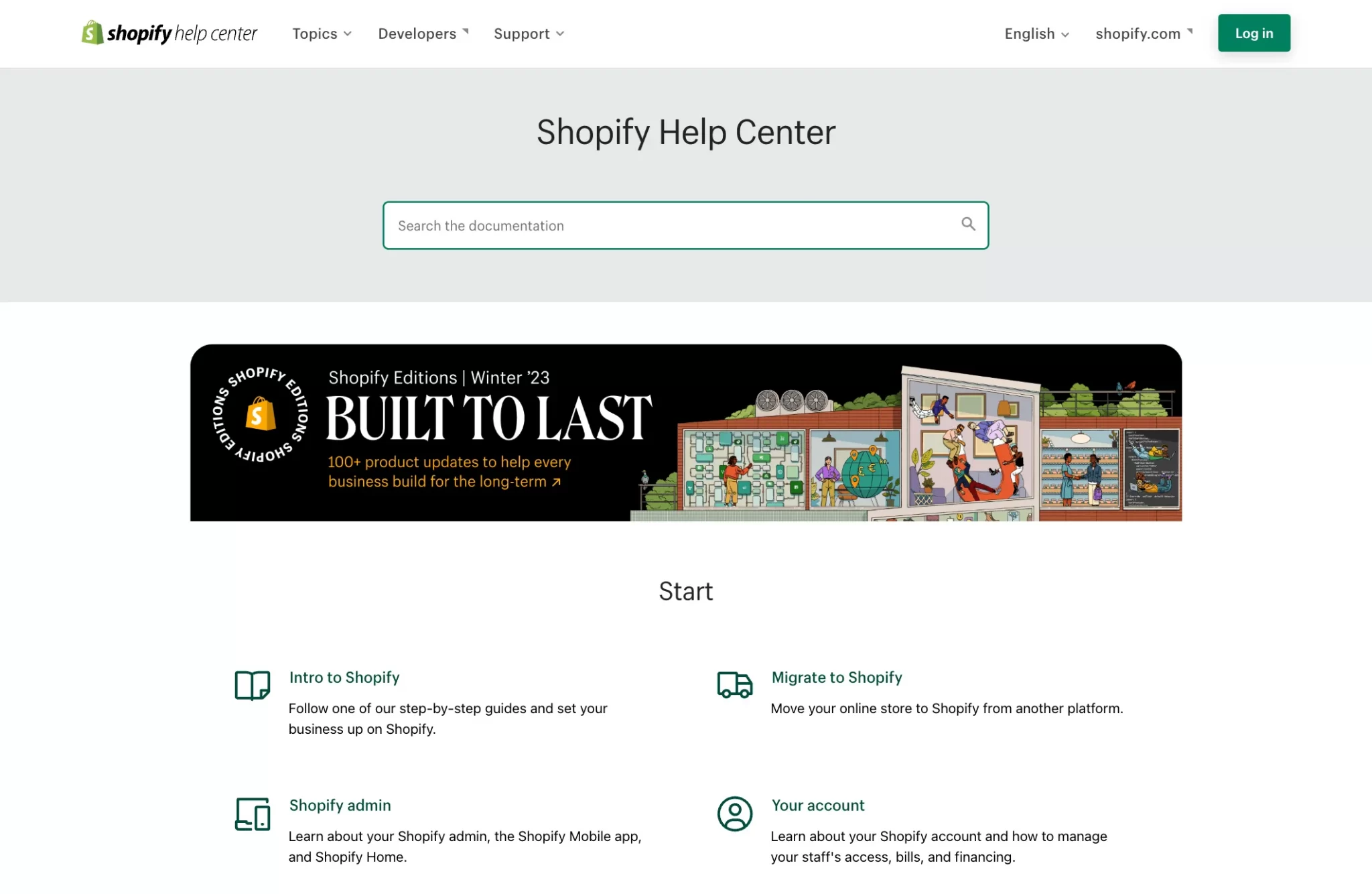
➤ The verdict:
Between Shift4Shop vs Shopify, Shopify takes the lead in customer support. It offers more comprehensive resources, faster response times, and a wider range of support options compared to Shift4Shop.
Security – Both Platforms Are Highly Secure
Shift4Shop provides robust security features designed to protect both merchants and customers. The platform is PCI-DSS compliant, which ensures that it adheres to industry standards for payment card security. Shift4Shop also includes SSL encryption to secure customer transactions and sensitive data. This encryption is essential for building customer trust, especially for businesses handling personal or financial information.
In addition to these built-in security features, Shift4Shop offers options for two-factor authentication (2FA) for store owners to further protect their accounts. The platform also monitors for fraud and provides tools to detect suspicious activity.
Now let's move on to Shopify. This platform is widely recognized for its strong security measures, which include PCI-DSS compliance and SSL encryption for all online stores. The platform’s hosting infrastructure is designed to protect against data breaches and cyberattacks, ensuring that customer data is safe and secure. Shopify’s security protocols are built into the platform, with updates automatically applied, so store owners do not need to worry about manually installing patches or handling security updates.
Shopify also provides two-factor authentication (2FA) to help secure merchant accounts and prevent unauthorized access. Shopify’s extensive security features include protection against fraud, chargebacks, and other risks, along with a robust fraud prevention system to help detect suspicious activity.
➤ The verdict:
In terms of security, it's a tie between Shift4Shop vs Shopify. Both platforms offer robust, enterprise-level features designed to protect merchants and customers, including PCI-DSS compliant and SSL encryption to secure transactions, along with tools like two-factor authentication (2FA) to protect store owners’ accounts. Additionally, both Shift4Shop vs Shopify provide fraud detection systems and safeguards against cyberattacks.
Shift4Shop vs Shopify – FAQs
How much does Shift4Shop cost?
Shift4Shop offers several pricing plans, including a free plan for users who choose Shift4Shop’s integrated payment gateway. For businesses that need more advanced functionality, Shift4Shop’s paid plans start at around $19/month and can go up to $229/month, based on the tier that you chose.
Is Shift4Shop completely free?
Shift4Shop is not completely free. However, it does offer a free plan, but it comes with specific conditions. The free plan is available to businesses that use Shift4Shop’s integrated payment gateway, which means you must process payments through Shift4Shop’s payment solution, Shift4 Payments. Additionally, this plan is only available for merchants in the US, so if you are an international online seller, you might need to opt for the paid version of Shift4Shop.
What are Shopify competitors?
Shopify competitors include well-known names in the eCommerce industry, such as Wix, BigCommerce, WooCommerce, and Magento. For more in-depth reviews of each competitors, please check out other articles on our LitExtension website.
Which platform is better for small businesses, Shift4Shop or Shopify?
For small businesses, Shopify is generally the better option. Its user-friendly interface, extensive support resources, and scalability make it an ideal choice for businesses that need to start small but plan to grow.
Shift4Shop may be more suitable for businesses on a tighter budget, particularly those that need more advanced built-in features without relying on third-party apps.
Final Thoughts
When comparing Shift4Shop vs Shopify, it’s clear that both platforms offer unique strengths and cater to different types of businesses. The decision between these two platforms ultimately depends on your specific business needs, budget, and growth ambitions.
For businesses seeking an affordable solution with essential eCommerce features and a built-in payment gateway, Shift4Shop offers excellent value, especially with its free plan for businesses using Shift4 Payments. It provides an all-in-one solution, including website building, product management, and marketing tools, making it a great option for businesses on a budget.
On the other hand, Shopify is an ideal platform for businesses looking for a more scalable solution. It stands out for its ease of use, vast app ecosystem, extensive customer support, and powerful tools for marketing, analytics, and international expansion. Shopify is perfect for businesses that want to start small and scale quickly, offering a higher degree of customization and flexibility as the business grows.
If you discovering the world of eCommerce and want to learn beyond the topic of Shift4Shop vs Shopify, please check out other articles on our LitExtension website to get expert tips and industry insights!

